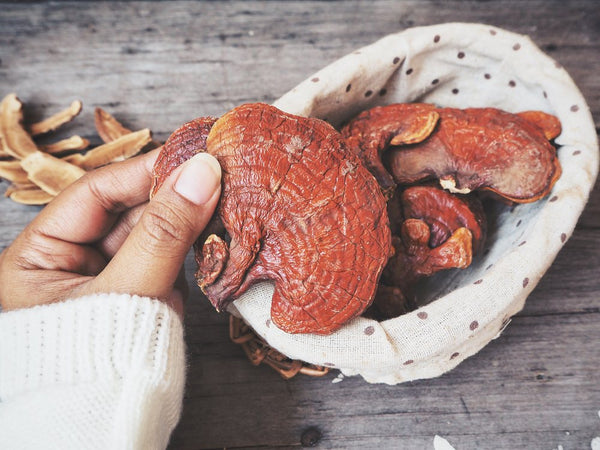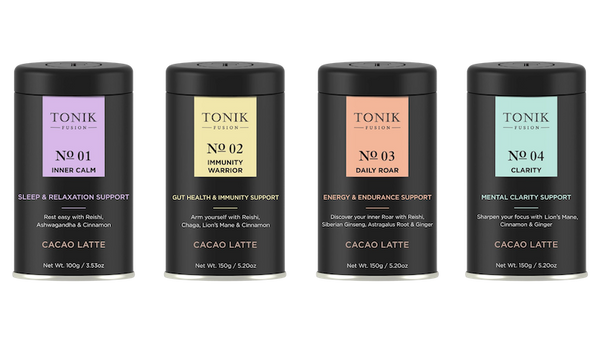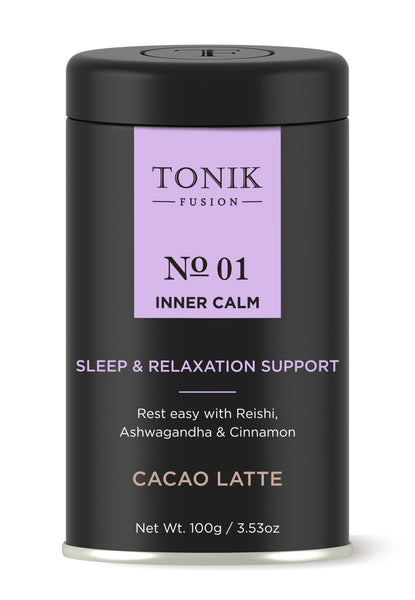What Does Reishi Do for Sleep? Sleep Benefits of the Reishi Mushroom
Being a mom of two and business owner, winding down for a good sleep was something I really used to struggle with. That changed when I ventured into the realm of adaptogenic mushrooms, creating blends that not only soothed my days but transformed my nights, thanks to one key ingredient: Reishi.
So can Reishi improve sleep? Yes, Reishi helps you sleep. It helps reduce stress and anxiety, aids in relaxation, and supports deeper sleep cycles, making it a valuable sleep aid in traditional medicine.
Does Reishi Help with Sleep?

The story of Reishi, or Ganoderma lucidum, begins in the dense forests of Asia, where it was once reserved for royalty. Known as the "Mushroom of Immortality," Reishi's use spans several cultures and millennia, prized not just for its longevity benefits but for its profound impact on relaxation and sleep.
This mushroom's legacy as a natural sedative and stress reliever forms the foundation of its modern appeal, offering a bridge to rest and relaxation we often seek in our fast-paced lives.
As well as improving sleep, Reishi boasts a series of other health benefits, such as acting as an anti-inflammatory, boosting your immune system, improving respiratory health, supporting your digestive system and even helping liver detoxification.
Reishi's Role in Sleep Enhancement

How Does Reishi Influence Sleep Quality?
Reishi's influence on sleep is multifaceted, working through various pathways to improve the sleep experience. By modulating the body's stress response, Reishi helps lower the cortisol levels that often keep us tossing and turning at night.
Its calming effect on the mind encourages a smoother transition to sleep, making it an invaluable tool for those seeking a natural way to improve sleep quality.
Can Reishi Help You Fall Asleep Faster?
For many, the challenge isn't just about achieving deep sleep but getting there in the first place. Reishi steps in as a gentle nudge towards slumber, its adaptogenic qualities balancing the body's stress hormones and creating a conducive environment for sleep onset.
Anecdotal evidence and emerging research suggest that incorporating Reishi into your nighttime routine can reduce the time it takes to drift off, making it a perfect aid in helping you fall asleep faster.
The Role of Reishi in Combating Insomnia and Sleep Disorders
Insomnia and other sleep disorders often stem from a complex interplay of factors, with stress and anxiety being significant contributors. Reishi's adaptogenic and anxiolytic properties make it a promising natural remedy for these conditions.
By addressing the root causes of sleep disturbances, Reishi offers hope for those grappling with insomnia, providing a holistic approach to restoring the body's natural sleep rhythms.
The Science Behind Reishi and Sleep

Why Does Reishi Make You Sleepy?
The magic of Reishi lies in its rich composition of bioactive compounds, including polysaccharides, triterpenes, and beta-glucans. These compounds interact with the body's central nervous system and stress response mechanisms, potentially reducing anxiety and inducing a state conducive to sleep.
Scientific studies have begun to shed light on these interactions, offering a glimpse into the biochemical foundation of Reishi's sleep-enhancing properties.
What Research Says About Reishi and Sleep
While the body of research on Reishi's impact on sleep continues to grow, key studies have already shed light on its significant benefits.
One study showed that Reishi made mice fall asleep faster and sleep longer by increasing a sleep-helping brain chemical and improving gut health. When the mice's gut bacteria were removed, the sleep benefits disappeared, showing that Reishi had positively impacted sleep.
Another notable study in the Journal of Ethnopharmacology revealed that Reishi mushroom use for three days notably improved total sleep and deep sleep in subjects. It boosted a crucial sleep-regulating substance, TNF-a, and affected brain areas linked to sleep cycles and memory.
What Does Reishi do for Deep Sleep and REM Phases
Deep sleep and REM are crucial for cognitive function and overall well-being, yet achieving these restorative sleep stages can be elusive for many.
Reishi's calming effect extends to the sleep cycle, potentially increasing the duration of deep sleep and enhancing the quality of REM phases. This not only improves sleep quality but also ensures that the body and mind receive the restorative benefits of a full sleep cycle.
Reishi Dosage and Timing for Sleep Benefits
To enhance sleep effectively, it's advised to take Reishi around an hour before bed, allowing its soothing properties to ease you into a restful state. Starting with a modest serving, like our Inner Calm Cacao Latte, is ideal for assessing your response.
This blend is crafted with a precise amount of Reishi, aligning with the daily recommended dosage range of 1.5 to 9 grams, ensuring you get the optimal benefits for sleep without surpassing your body's comfort level. Adjusting the amount gradually lets you find the perfect balance for your needs.
Reishi's Effects on Stress and Anxiety
Reishi's advantages reach further than just improving sleep; it can also play a significant role in lowering stress and anxiety by reducing cortisol levels.
As an adaptogen, Reishi naturally moderates the body's stress response system, providing a holistic approach to managing everyday stress. This comprehensive impact on wellness positions Reishi as a crucial element in both stress reduction and sleep improvement routines.
FAQ for Reishi and Sleep

How Long Does It Take for Reishi to Improve Sleep?
The effects of Reishi on sleep can vary, with some individuals experiencing improvements within a few days and others over a few weeks. Consistent use is key to seeing benefits.
Can Reishi Mushroom Help You Relax?
Reishi mushroom has properties that may help relax the body and mind, making it easier to unwind before bedtime. Its calming effects could contribute to improved sleep quality and relaxation.
Can I Combine Reishi with Other Adaptogens Like Ashwagandha for Better Sleep?
Yes, combining Reishi with Ashwagandha can enhance the sleep-promoting effects due to their complementary adaptogenic properties, aiding in stress reduction and relaxation. In fact, our Inner Calm cacao latte combines the power of both of these adaptogens in a delicious drink, you can check it out here.
Is It Safe to Take Reishi Daily for Stress Management?
Taking Reishi daily is generally safe for most people and can be an effective way to manage stress levels. Always monitor your body's response and adjust accordingly.
Can You Take Reishi and Magnesium Together?
Yes, Reishi can be taken alongside magnesium. This combination is often used to enhance relaxation and sleep quality, as magnesium supports muscle relaxation and Reishi contributes to overall calmness.
What Are the Spiritual Benefits of Reishi Mushroom?
Reishi is revered not just for its physical benefits but also for its spiritual ones. Traditionally, it's been used to promote mental clarity, emotional balance, and a deeper connection to one's inner self, making it a valued mushroom in meditative and spiritual practices.
Wrap Up
Incorporating Reishi into your sleep routine can be a transformative experience, offering a natural path to better sleep and reduced stress. Our Inner Calm blend, with its carefully measured dose of Reishi, provides a convenient and delicious way to enjoy these benefits.

Visit Tonik Fusion’s shop to explore our range of cacao latte blends and take the first step towards a restful nights sleep.
Disclaimer: The information provided in this article should not be used as a substitute for professional medical advice, diagnosis, or treatment. The statements contained herein have not been evaluated by the Food and Drug Administration (FDA). Before adding Reishi to your health and wellness routine, talk to a health care professional about the potential benefits, side effects, and uses of this mushroom.
